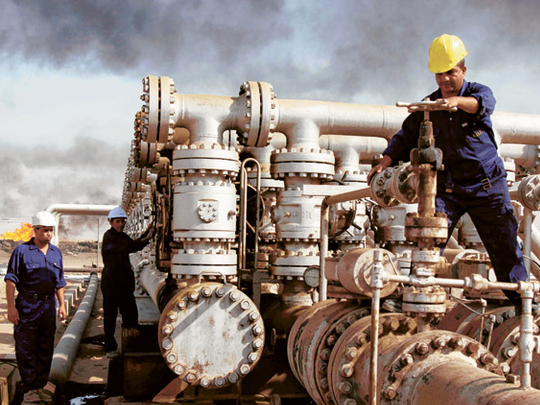
Basra, Iraq: Over a recent dinner, two friends — both local businessmen — dished over a simmering topic in Iraq's oil-rich port city: whether to boost Basra's future by partially breaking away from the federal government in Baghdad.
"How long will Basra act as Iraq's milk cow while we are starving?" Najim Edan said, arguing that the city and province that surrounds it could thrive if it stopped sending more money to the Iraqi capital than it gets back in government aid.
His friend Mohammad Abbas was pessimistic, fearing conflict between local factions and corruption if Basra declares autonomy.
"Believe me, we will not get the milk we want," he replied. "And if we do, we will not get it fresh, but sour."
It's a constant complaint in Basra, where a boom in foreign oil investment has spurred a push to create a self-ruled region in Iraq's south.
Constitutional clause
The constitution allows provinces — or groups of them — to break away into autonomous regions akin to Kurdistan in the north, and Basra's provincial council has twice sought to hold a referendum, only to meet stalling from Baghdad. The movement is likely to rev up once more now that a new government in Baghdad was formed this week.
An autonomy move in Basra could further weaken Iraq's central government by dividing the nation and lead to tussles over control of oil, as have occurred between Baghdad and the Kurds. A breakaway Basra could also fall into turmoil as local factions vie for power — and could come under heavy influence of Iran, which already is looking to increase its economic ties with Basra.
In fact, the biggest new investment is coming from Iran — including a nearly $1 billion (Dh3.67 billion) plan to build housing, hotels and a mall.
"While the foreign companies, mainly the oil ones, are entering Basra to tap into its resources, Basrawis are being crushed by deprivation and poverty," said Wail Abdul Latif, a former lawmaker who is the chief architect of Basra's autonomy bid.
The province is entitled to $1 for each barrel of oil produced or refined, and for every 150 cubic metres of gas produced, along with 5 per cent from the border-crossing and port revenues. In theory, the oil and gas share alone should amount now to around $2 million a day for Basra. But Baghdad must approve each project before releasing the funding for it and that is not happening, according to the head of Basra's provincial council, Jabar Ameen Jabir.
Funding irony
With autonomy, the province could try to claim a larger share of oil profits and greater say over how they are used. It would also get a bigger slice of the federal budget given to provinces to fund local administration and security. Basra received $190 million this year, but as an autonomous region it could claim up to $9 billion.
The push can be traced back to the 1920s, when a group of Basra's elite demanded it be declared a Gulf statelet under British protection like neighbouring Kuwait. The British, who wanted a strong central government in Baghdad, ignored the calls.
After Saddam's ouster, the Islamic Supreme Council of Iraq pushed for an autonomous southern region of nine provinces, including Basra. But the campaign failed to win support. Another attempt in 2008 failed when it was drowned out by calls for nationalism by political allies of Prime Minister Nouri Al Maliki ahead of provincial elections.
But the tide is turning, and many of Al Maliki's backers now support holding an autonomy referendum.
Declaring autonomy requires approval in a referendum by the province's population. Holding a referendum requires a motion by either one-third of the provincial council or one-tenth of eligible voters. Once that is attained, the province turns to Baghdad and requests that the national Independent Election Commission organise the vote.
Basra's council has twice asked Baghdad to organise the vote. The first time in September, federal officials demanded additional documents to prove the necessary support. The second attempt, in October, got bogged down with the nine-month delay in forming a federal government.
Yet fears abound that self-rule could unleash political violence in Basra. Al Maliki's State of Law party currently dominates the provincial council, but radical cleric Moqtada Al Sadr's movement — including its militia — holds considerable influence in the city.
Worries of turmoil also hung over Abbas and Edan's dinner conversation.
"That environment will then create a hotbed for corruption and gangs and we will suffer," said Abbas, a 40-year old car dealer.
Edan, a 41-year-old electrical engineer, likened that possibility to a necessary growing pain. "This will be only at the beginning, and then everything will be sorted out," he said.
Oil hub: Battered by conflict
Basra is strategically crucial for Iraq. With a population of about 3 million people, it is Iraq's second-largest province and home to about 70 per cent of the country's proven oil reserves of 143.1 billion barrels.
The province, located on the Arabian Gulf bordering Kuwait and Iran, is Iraq's only outlet to the sea and is the hub for most of Iraq's oil exports of nearly 1.9 million barrels a day to the international market.
Still, Basra looks like a city forgotten by history, battered by Iraq's repeated conflicts, starting with the 1980-1988 war with Iran through the 2003 US-led invasion.
Impoverished residential settlements crowd its outskirts. Piles of garbage and pools of stagnant water and sewage mar its dust-covered streets where donkeys, stray dogs, sheep and goats roam. Some neighbourhoods endure water and electricity shortages.












